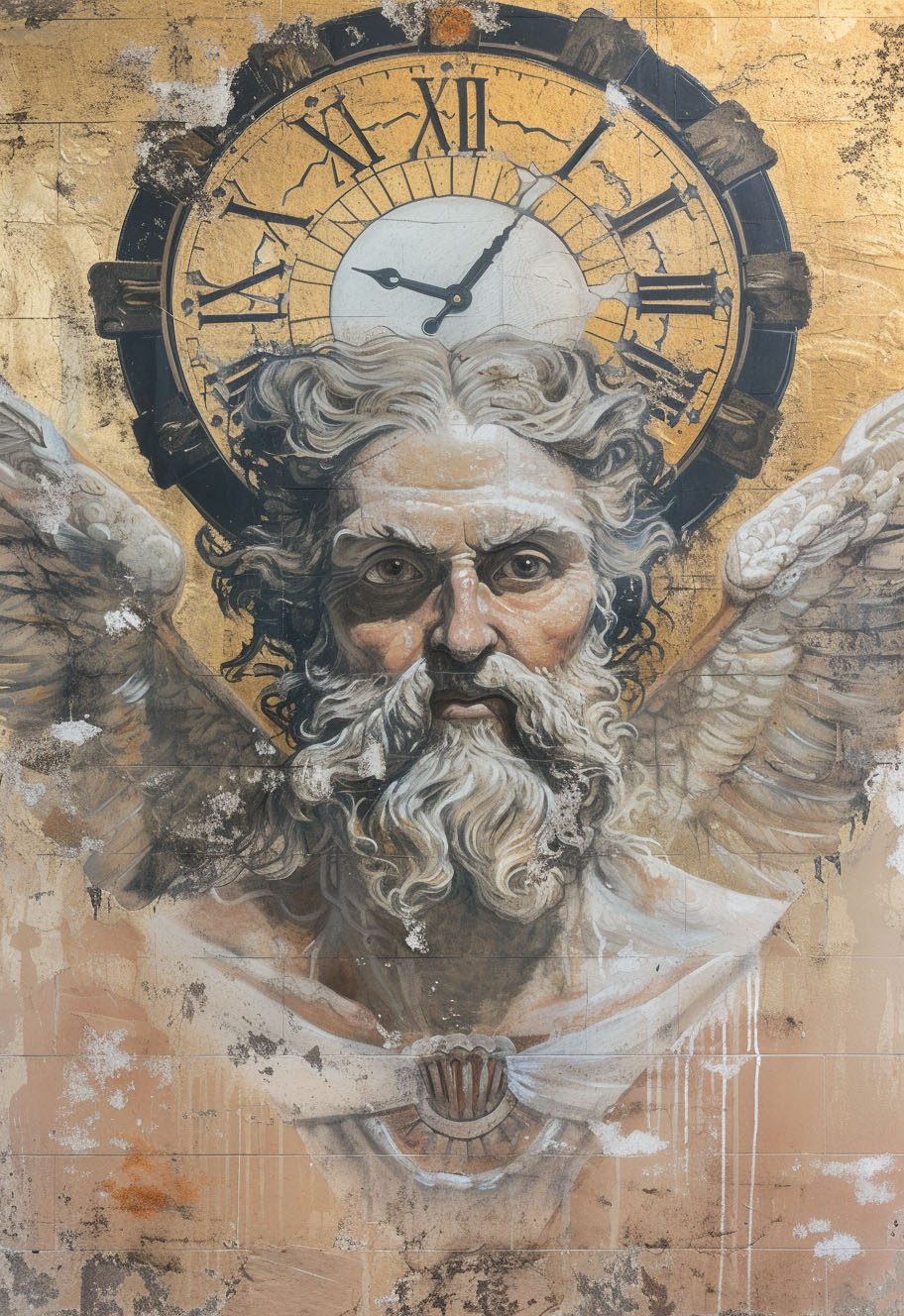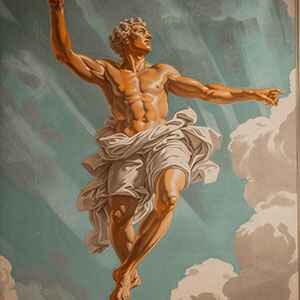Cronus
In Greek mythology, Cronus, also spelt Kronos or Kronus, is a significant figure and a Titan. He is known for being the leader of the Titans, the race of powerful and primordial deities who ruled the cosmos before the Olympian gods. Here are key aspects of Cronus in Greek mythology:
Parents: Uranus & Gaea
Siblings: NA
Consort: Rhea
Children: Zeus, Hera, Hades, Poseidon, Demeter, Hestia

Parentage and Birth: Cronus is the youngest son of Uranus (the sky) and Gaea (the Earth). Uranus had imprisoned his elder children, the Hecatoncheires (Hundred-Handed Ones) and the Cyclopes, in Tartarus. Gaea, angered by this, encouraged Cronus to overthrow his father.
Overthrow of Uranus: Following his mother's advice, Cronus castrated Uranus using a sickle, thus separating the sky from the Earth. This act marked a significant shift in cosmic order, leading to the rise of the Titans.
Ruler of the Titans: After overthrowing Uranus, Cronus became the ruler of the Titans. He married his sister Rhea, and they became the parents of the next generation of gods, including Zeus, Hera, Hades, Poseidon, Demeter, and Hestia.
Fear of Overthrow: Cronus, having heard a prophecy that he would be overthrown by one of his own children, became paranoid and fearful of losing his power. As a result, he decided to prevent the prophecy by swallowing each of his children upon their birth.
Birth of Zeus: Rhea, unhappy about the fate of her children, managed to save Zeus by tricking Cronus. She hid Zeus on the island of Crete and presented a stone wrapped in swaddling clothes, which Cronus swallowed, thinking it was his newborn son.
Zeus' Rebellion: Zeus, after reaching adulthood, led a rebellion against Cronus and the Titans. With the help of his siblings and the Cyclopes, Zeus eventually overthrew Cronus, fulfilling the prophecy.
The Titanomachy: The war between the Titans and the Olympians, known as the Titanomachy, resulted in the defeat of Cronus and the Titans. The defeated Titans were banished to Tartarus, a deep abyss in the underworld.
Punishment and Imprisonment: After the Titanomachy, Cronus, along with other Titans, was imprisoned in Tartarus by the victorious Olympians. Zeus became the new ruler of the cosmos.
Association with Time: The name "Cronus" is etymologically linked to the Greek word "chronos," meaning time. In some traditions, Cronus is associated with the personification of time, and he is sometimes identified with the Titan Cronus who is the father of Zeus.
Cultural References: The story of Cronus and his overthrow by Zeus is a pivotal episode in Greek mythology. It reflects themes of divine succession, the cyclical nature of time, and the struggle for cosmic order.
Cronus, as a key figure in Greek mythology, embodies the transition of power from the Titans to the Olympian gods. His actions and their consequences set the stage for the establishment of the Olympian order and the rule of Zeus as the king of the gods.
Immediate Family
Quick Facts
- He is the leader of the Titans.
- He castrated Uranus to overthrow him.
- He became the ruler of the Titans.
- He feared being overthrown by his own children.
- He swallowed his children to prevent the prophecy.
- Zeus led a rebellion against him.
- He and other Titans were imprisoned in Tartarus.
- The name "Cronus" is associated with time.
- His overthrow by Zeus is a pivotal episode in Greek mythology.
Further Reading
Art &
Architecture
Ancient Greek art and architecture, with its harmonious proportions and timeless elegance, continue to inspire awe and admiration millennia later.
Discover
Greek Mythology & Mythical Characters
Greek mythology, a rich tapestry of gods, heroes, and mythical creatures, captivates the imagination with its tales of love, betrayal, and epic adventures that delve into the depths of the human psyche.
Discover
Ancient Greek History
Ancient Greek history, marked by remarkable achievements in democracy, philosophy, and warfare, shaped the foundation of Western civilization, leaving an indelible legacy of innovation and cultural influence that continues to resonate to this day.
Discover
Ancient Greek Olympics
The ancient Greek Olympics, held in Olympia every four years, celebrated athleticism, unity, and cultural pride, serving as a testament to the enduring spirit of competition and excellence that transcends time and borders.
Discover
Ancient Greek Wars
Ancient Greek wars, such as the Persian Wars and the Peloponnesian War, were pivotal conflicts that shaped the course of history, highlighting the struggle for power, independence, and the clash of civilizations in the ancient Mediterranean world.
Discover
Ancient Greek Culture and Society
Ancient Greek culture and society, characterized by its emphasis on art, philosophy, and civic engagement, fostered a vibrant intellectual and social landscape where innovation flourished, democracy thrived, and the pursuit of knowledge and excellence was celebrated as fundamental values of civilized life.
Discover

